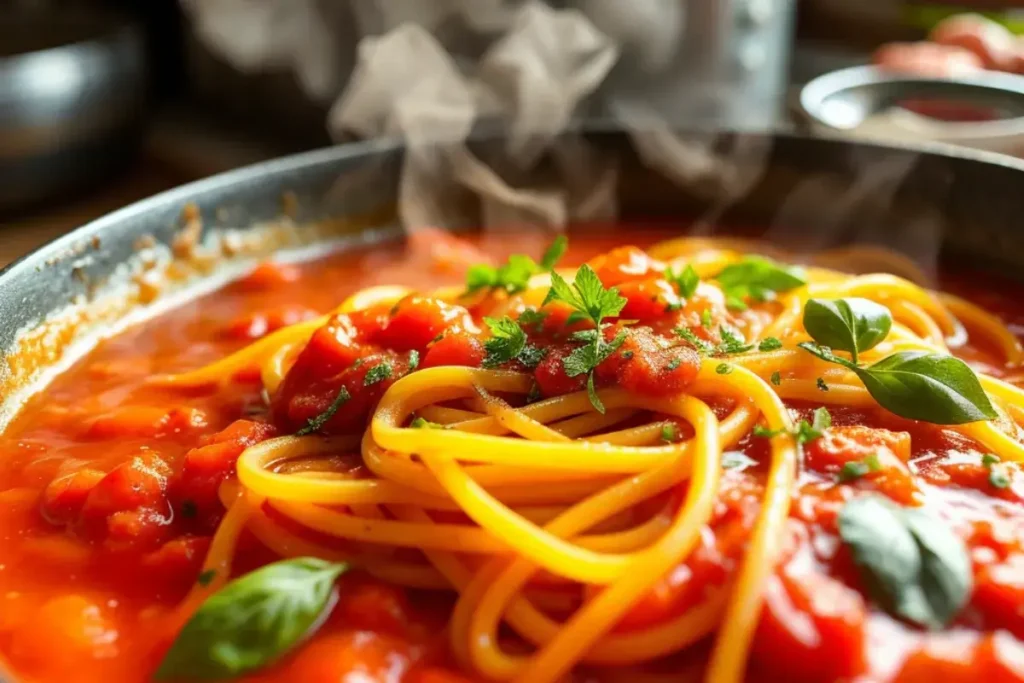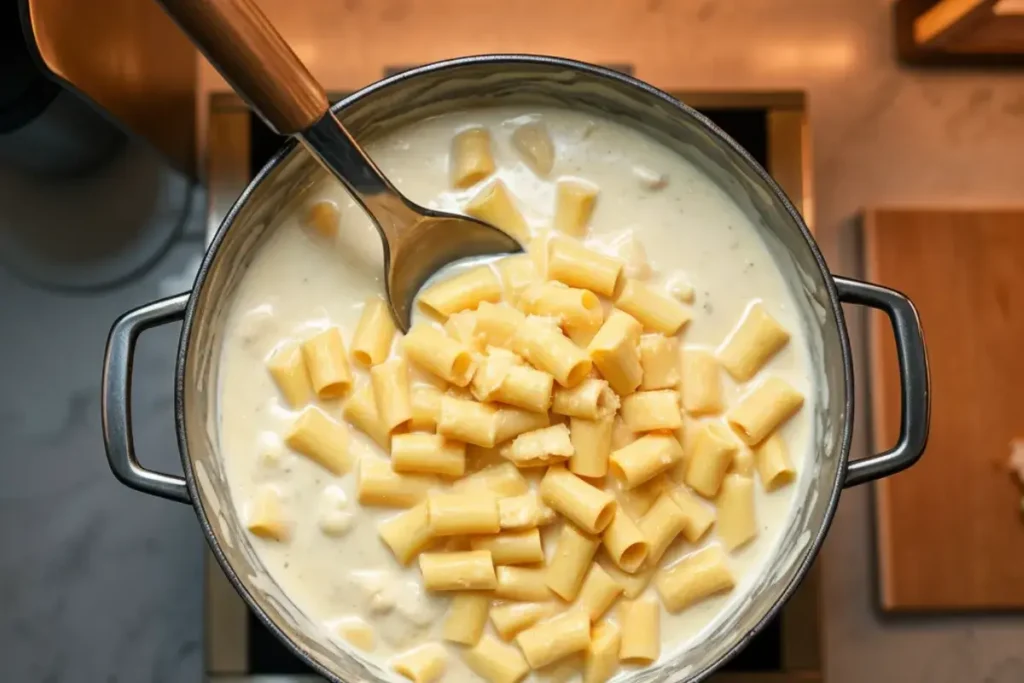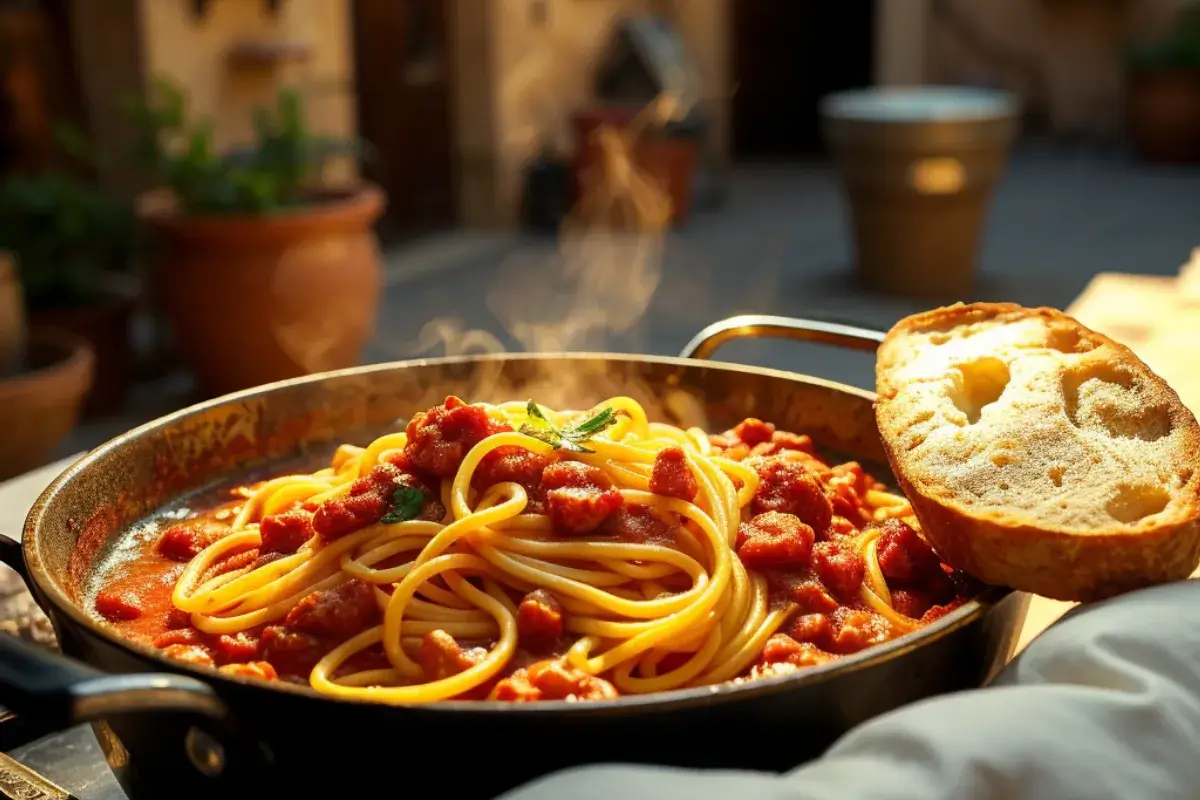Cooking pasta to perfection is an art. One term that often comes up is al dente, which refers to pasta that’s firm to the bite. But what happens if your pasta isn’t quite done, and you toss it in the sauce? Can it finish cooking in there? Let’s explore how al dente pasta behaves and whether it can fully cook in sauce.
What Does ‘Al Dente’ Mean?
In Italian, al dente means “to the tooth.” This refers to the texture of pasta when it’s firm but not hard. It creates the perfect balance of texture and flavor absorption.
The goal is to stop boiling the pasta just before it’s completely tender. If pasta is overcooked, it turns mushy and loses its structure. However, if it’s too firm, it may taste raw. Striking this balance is key to achieving the ideal texture.
The Science Behind Al Dente Cooking
Pasta is made from starch. When boiled, heat and water interact with the starch, softening the pasta. If you boil pasta for too long, the starch breaks down and turns it mushy. This is why al dente is so important—it ensures the pasta remains firm but tender.
By removing pasta from the water while it still has bite, you allow it to finish cooking in the sauce. This method not only enhances the texture but also improves flavor. To learn more about this process, visit Serious Eats’ pasta cooking science.
Will Al Dente Pasta Cook in Sauce?
Yes, al dente pasta can indeed finish cooking in sauce. In fact, this method is often used in many pasta dishes. Simmering pasta in sauce for a few minutes helps it absorb more of the sauce’s flavors. Additionally, the extra cooking time in sauce allows the pasta to soften slightly more without becoming mushy.
There are several factors that influence pasta’s ability to cook in sauce:
- Cooking Time: The longer pasta sits in the sauce, the softer it gets.
- Sauce Thickness: Thick sauces cling better to pasta and may reduce cooking time.
- Heat Levels: Simmering pasta gently in sauce, rather than boiling it, ensures gradual cooking.
For a complete guide on how to perfect this technique, check out pasta cooking tips.
Why Finish Cooking Pasta in Sauce?
If you’ve ever wondered will al dente pasta cook in sauce, finishing it in sauce is actually a preferred method for enhancing texture and flavor:
- Flavor Absorption: Pasta absorbs the sauce’s flavor as it simmers. This gives the dish a more cohesive taste.
- Improved Texture: Finishing pasta in the sauce helps maintain that perfect al dente texture. The pasta won’t overcook in water but will soften slightly in the sauce.
- Starch Thickens Sauce: As the pasta continues cooking, it releases starch. This helps thicken the sauce naturally, creating a creamier consistency.
As a result, this method not only makes the dish more flavorful but also improves its overall texture.
How Long Should Pasta Cook in Sauce After Boiling?

The answer to will al dente pasta cook in sauce depends on a few factors, Generally, it only takes a few minutes for the pasta to finish cooking in the sauce:
- Type of Pasta: Thin pasta like spaghetti may need 2-3 minutes. However, thicker pasta like rigatoni could need up to 5 minutes.
- Sauce Consistency: A thick, hearty sauce might require more simmering time compared to a thinner one.
- Stirring: Regularly stirring the pasta is important to prevent it from sticking to the pan and to ensure even cooking.
By tasting the pasta occasionally, you can determine when it has reached the perfect texture.
Is It Safe to Cook Al Dente Pasta in Sauce?
Yes, it’s perfectly safe to finish al dente pasta in sauce. Just be sure not to overcook it. Allow the pasta to simmer gently, which ensures it finishes cooking without losing its firmness. Furthermore, this method reduces the risk of the pasta turning mushy, making it a safe and effective way to enhance your dish.
Common Mistakes to Avoid When Cooking Pasta in Sauce
While it’s a great technique, there are some common mistakes that can lead to less-than-perfect results:
- Overcooking: Letting the pasta simmer too long can cause it to become mushy. Once the pasta passes the al dente stage, it loses its ideal structure.
- Using Too Much Sauce: Overloading the pasta with sauce can drown its texture and make it soggy.
- Not Stirring Enough: Stirring frequently is essential. If you don’t stir enough, the pasta may stick to itself or the pan, causing uneven cooking.
By avoiding these mistakes, you’ll ensure that your pasta is cooked to perfection every time.
Step-by-Step Guide: How to Properly Cook Pasta in Sauce
Cooking pasta in sauce is not difficult, but there are key steps you need to follow to ensure the perfect texture and flavor. Here’s a step-by-step guide:
- Boil Pasta Until Al Dente: Begin by boiling your pasta in salted water. Be sure to drain it just before it becomes fully tender. This is critical because it will finish cooking in the sauce. For detailed steps on achieving al dente pasta, read this guide.
- Prepare the Sauce Separately: While the pasta is boiling, prepare your sauce in a separate pan. Whether you’re making a tomato-based sauce, a cream sauce, or an oil-based sauce, have it ready for the final step.
- Combine Pasta with Sauce and Simmer: After draining the pasta, immediately add it to the simmering sauce. Let the pasta cook in the sauce for about 2-5 minutes, depending on the type of pasta. Stir occasionally to ensure even cooking.
- Adjust Cooking Time Based on Pasta Type: Thinner pasta needs less time, while thicker pasta may require a longer simmer. Keep tasting until the pasta reaches your preferred texture.
By following these steps, you’ll guarantee that your pasta is cooked perfectly al dente while fully absorbing the sauce’s flavors.
Adjusting Sauce Types for Cooking Al Dente Pasta
The type of sauce you choose can greatly affect how your al dente pasta finishes cooking. Different sauces work best with specific types of pasta and affect the final result in unique ways.
- Thick Sauces: Creamy sauces or hearty tomato-based sauces cling better to pasta and may require less simmering time. These sauces are rich, so the pasta will absorb their flavor quickly.
- Thin Sauces: Oil-based or light broth sauces need a bit more simmering time to meld with the pasta. Since they’re lighter, they don’t coat the pasta as quickly, requiring more time for absorption.
- Sauce Consistency Adjustments: If you notice your sauce is too thick, add a small amount of pasta water to loosen it up. The starchy water will help blend the sauce without making it too thin.
By considering the sauce type, you can ensure that your al dente pasta finishes cooking to perfection, without losing its bite or becoming overcooked.
Using Less Water: The One-Pot Pasta Method
Another popular method of cooking pasta is the one-pot pasta technique. In this method, you cook the pasta directly in the sauce, without draining it, allowing the starch from the pasta to thicken the sauce. But will the pasta stay al dente when cooked this way?
How It Works:
- You add uncooked pasta to a pot with the sauce, along with enough liquid to cover the pasta.
- The pasta absorbs the liquid as it cooks, and the starch released from the pasta naturally thickens the sauce.
- This method saves time and reduces cleanup since everything cooks in one pot. Try this delicious one-pot pasta recipe for inspiration.
Does it maintain al dente texture? While the one-pot method is convenient, it can be tricky to maintain the al dente texture. Since the pasta sits in the sauce for a longer period, you must carefully monitor the cooking time to prevent overcooking.
Should You Pre-Cook Al Dente Pasta for Baked Dishes?
Baked pasta dishes like lasagna or baked ziti require a slightly different approach to achieve the ideal texture. If you want your pasta to stay al dente, it’s important to consider how long it will be baked in the oven.
Why Pre-Cooking Is Important:
- For baked pasta dishes, pre-cooking the pasta until just al dente is essential. If you skip this step or undercook the pasta, it may not cook properly in the oven. However, if you overcook it, the pasta will turn mushy once baked.
- By parboiling (boiling partially) the pasta for just a few minutes, you ensure it stays firm through the baking process.
How to Avoid Overcooking:
To avoid overcooking pasta in baked dishes, make sure you undercook it by 1-2 minutes. This way, the pasta will finish cooking in the oven but won’t become too soft.
Other Factors That Affect Cooking Pasta in Sauce

Several factors can influence how pasta cooks in sauce, beyond just the time and method:
- Altitude and Boiling Point: At higher altitudes, water boils at a lower temperature, which can lengthen the cooking time. If you’re cooking at high altitude, allow more time for the pasta to reach al dente before finishing it in the sauce.
- Pasta Shape and Thickness: Thicker pasta shapes like penne or rigatoni will take longer to finish cooking in sauce than thinner pasta like spaghetti or linguine.
- Cooking Utensils and Stove Types: Using a heavy-bottomed pan helps retain even heat distribution. On gas stoves, the heat can be easily adjusted, whereas electric stoves might not respond as quickly.
By being aware of these factors, you can better control the cooking process and ensure the best results.
Can You Cook Dry Pasta Directly in Sauce?
You might wonder if it’s possible to cook dry pasta directly in sauce without boiling it first. While it can be done, this method requires extra liquid and careful attention to cooking time.
How It Works:
- Dry pasta absorbs liquid as it cooks, so you’ll need to add more sauce or water than usual.
- Cooking dry pasta directly in sauce takes longer, as it must first absorb enough moisture to soften.
However, this method may dilute the flavor of the sauce, since extra liquid is required. While convenient, it’s generally better to boil pasta first and finish it in the sauce to maintain flavor and texture.
Pros and Cons of Cooking Pasta in Sauce
As with any cooking method, there are advantages and disadvantages to finishing pasta in sauce.
Pros:
- Pasta absorbs more flavor from the sauce.
- Fewer dishes to clean, as everything cooks in the same pan.
- The sauce thickens naturally due to the starch released from the pasta.
Cons:
- There’s a risk of overcooking the pasta if you leave it in the sauce too long.
- Some sauces may become too thick, requiring additional liquid.
- Not every pasta shape responds well to this method.
Overall, the benefits of cooking pasta in sauce generally outweigh the drawbacks, as long as you’re mindful of timing and sauce consistency.
Frequently Asked Questions
1. Can you cook pasta in sauce instead of water?
Yes, you can cook pasta directly in sauce, but you’ll need to add extra liquid. This method takes longer and can dilute the sauce’s flavor, but it’s a convenient one-pot option.
2. How do you keep pasta from getting mushy in sauce?
To prevent mushy pasta, remove it from the boiling water just before it’s fully cooked. Then, finish cooking it in the sauce for a few minutes, keeping a close eye on the texture.
3. Do Italians cook pasta in sauce?
Yes, finishing pasta in sauce is a common practice in Italian cooking. This method helps the pasta absorb the sauce’s flavor while keeping its al dente texture.
4. How much sauce do I need to finish cooking pasta?
You’ll need enough sauce to coat the pasta without drowning it. For best results, add a small amount of reserved pasta water to the sauce to loosen it if needed.
5. Can gluten-free pasta be cooked al dente and finished in sauce?
Yes, gluten-free pasta can be cooked al dente and finished in sauce. However, it may be more delicate, so handle it gently to avoid breaking.

